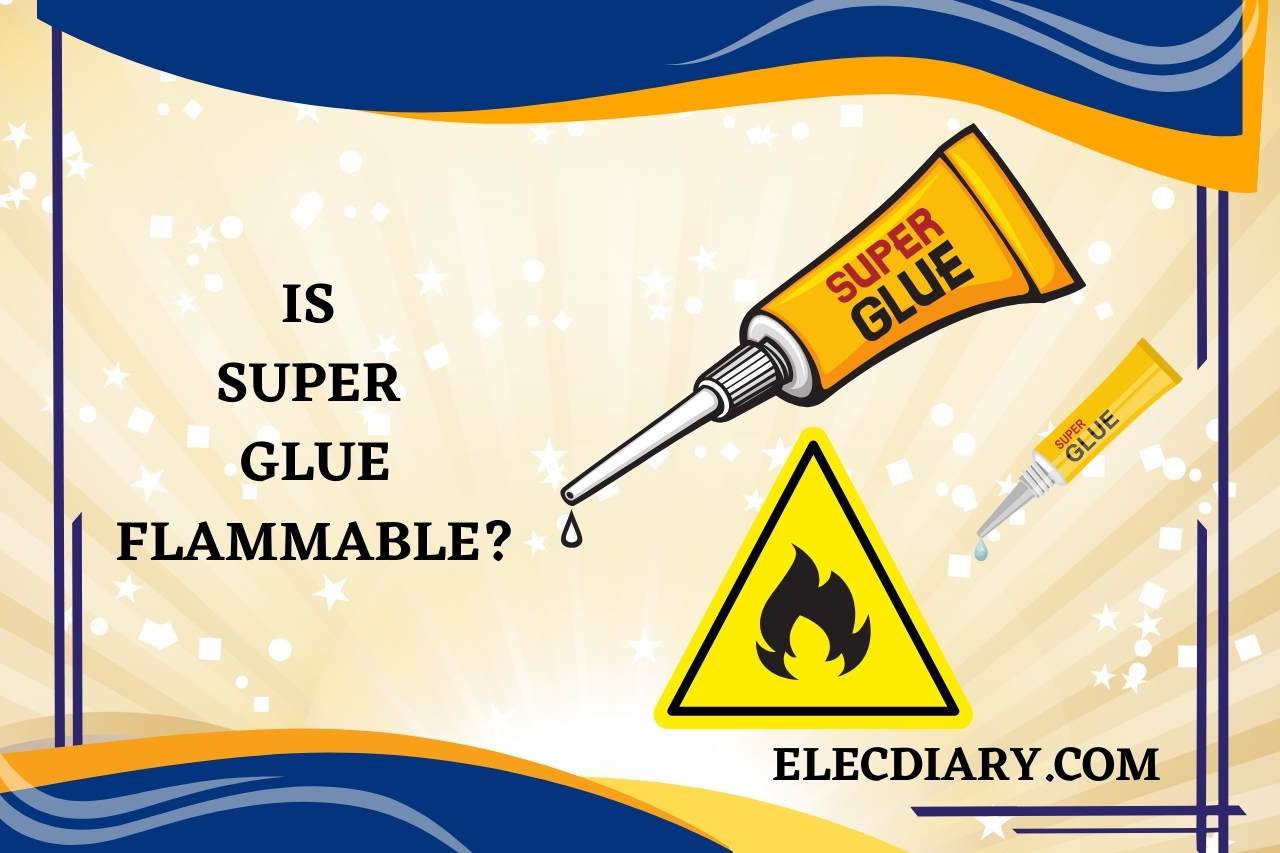Is Super Glue Flammable? (What You Need to Know)
“Is super glue flammable?” is a question that resonates with many, especially when safety is a concern in crafting and DIY projects. Being an appliance used in almost every household, super glue’s usefulness should not disguise the need to be careful when used. Delving deeper into super glue’s properties, this article sheds light on its flammability when both wet and dry, its reactions to high temperatures, and the potential aftermath of its exposure to heat. Buckle up as we uncover these nuances, ensuring you’re well-informed and equipped to handle super glue with confidence and care the next time you need something fixed.
Is Super Glue Flammable?
Yes but with some conditions applied. A relatively detailed answer to the question, “Is super glue flammable?” is that while super glue itself is not highly flammable when cured, its fumes can be flammable when freshly applied, and the glue can be combustible in its liquid state.
Digging Deeper
- Components of Super Glue: Cyanoacrylate, the primary component of super glue, can give off fumes that are irritating while having the potential to be flammable when they come in contact with an open flame. Thus, it’s important to ensure proper ventilation when using the adhesive.
- Cured vs Liquid State: Once super glue has cured or hardened, it becomes resistant to combustion. However, in its liquid state or while it’s still drying, it’s more vulnerable to catching fire if exposed to a flame or high heat.
- Safe Storage: It’s essential to pick a cool, dry place to store super glue containers away from direct sunlight and heat sources. This not only prolongs its shelf life but also reduces any fire hazards.
- Safety First: While working with super glue, it’s advisable to avoid open flames, sparks, or smoking to ensure safety and reduce the risk of unexpected combustion.
By understanding the properties of super glue and taking the necessary precautions, you can ensure a safe and effective application process. Always prioritize your safety first and be aware of the surrounding environment when using any adhesive product.

What Temperature does Superglue Catch Fire At?
The temperature at which super glue catches fire varies, but it generally becomes combustible around 80-93°C (176-200°F).
Further Insight
- Combustion Point: Cyanoacrylate, the main ingredient in super glue, starts to decompose when exposed to temperatures around the aforementioned range, posing a potential fire risk.
- Usage Precautions: For optimal safety, it’s crucial that you keep super glue away from high-heat sources. Using it near stoves, heaters, or other heat-emitting devices could end in a hazardous endeavor.
Remember, while super glue’s combustibility is relatively low, it’s recommended to prioritize your and your family’s safety and be aware of the adhesive’s characteristics before use.
Is Super Glue Flammable When Wet?
Yes, but unlikely. Let us explain: Super glue, in its wet form, is not highly flammable but can emit flammable fumes. So unless there is an open flame or spark, you are rather safe. Our suggestion, however, is to always keep the super glue away from heat or ignitable environments, whether it’s wet or dry.
A Closer Look
- Flammable Fumes: The wet state of super glue releases cyanoacrylate fumes, which can ignite when exposed to an open flame or spark. Using the adhesive in well-ventilated areas is essential to ensure safety.
- Combustibility Concerns: Although the liquid itself is not keen to burst into flames easily, the risk lies in the fumes it produces. Keeping your workspace free of open flames or sparks when using super glue minimizes the chance of inadvertent ignition.
In essence, while the wet super glue isn’t inherently flammable, the fumes it produces can be. Proper care and precautions should be exercised during its application to avoid any damage.
Is Super Glue Flammable When Dry?
Once cured or dried, super glue is not typically flammable, making it relatively safer than being wet.
Diving Deeper
- Transformation Post-Drying: After the evaporation of its solvents and the curing process, super glue becomes a solid plastic-like substance. This transformation reduces its flammability risk significantly, making it much more stable and unlikely to catch fire.
- Environmental Factors: Although dried super glue resists ignition, it’s still crucial to note that its combustion point can be reached under extreme conditions. It’s always advisable that you keep any cured adhesive away from high-temperature sources.
To sum it up, the dry state of super glue presents a reduced risk of flammability. However, practicing safety and understanding the material’s properties, regardless of its physical form, remain essential for all adhesive applications.
Is Super Glue an Explosive?
No, super glue is not classified as an explosive material. However, it can react with certain substances, producing exothermic reactions. Although the possibility of an explosion is slim, it’s better to be cautious.
Breaking It Down
- Chemical Composition: Super glue’s primary ingredient is cyanoacrylate. While it can give off heat and fumes when reacting with specific materials (like cotton), it does not possess the explosive characteristics of materials designed for detonation.
- Safety Precautions: Although not explosive, super glue can cause a rapid, exothermic reaction when in contact with certain textiles. This means it can get unexpectedly hot, posing a burn risk. Hence, you should avoid applying super glue to or near materials like cotton or wool.
- Storage Considerations: Store super glue in cool, dry places away from direct sunlight. While it’s not explosive, ensuring proper storage can prevent unwanted chemical reactions while also preserving its quality.
In conclusion, while super glue is not an explosive, it’s vital to handle and store it responsibly to avoid potential hazards.
Is Super Glue Resistant to Heat?
To a certain extent, yes. Super glue has moderate heat resistance, but it can weaken and degrade when exposed to prolonged high temperatures. Commonly, super glues are made to endure a healthy amount of heat for household use.
Understanding the Resilience
- Heat Tolerance Range: Most standard super glues can withstand temperatures up to 80-93°C (176-200°F) according to simple experiments. Beyond this range, the adhesive properties might diminish.
- Application Scenarios: When bonding materials are expected to undergo temperature fluctuations, it’s crucial to select a glue variant specifically designed for such conditions. We have seen situations where people got hurt using common super glue in high-temperature environments. There are high-temperature-resistant glues available in the market for such purposes.
- Safety Tip: Prolonged heat exposure can not only weaken the bond but also release fumes. Always ensure the bonded items aren’t subjected to extended periods of high heat.
In essence, while super glue offers some level of heat resistance, understanding its limits is essential for its practical and lasting application. A typical super glue should tolerate enough heat for your daily needs.

What Happens If Super Glue Gets Hot?
Responding to “What happens if super glue gets hot?” – Super glue can degrade, weaken, or emit fumes when exposed to elevated temperatures beyond its tolerance range.
- Bonding Integrity: One of the primary concerns is the breakage of bonds in the adhesive. Heat can cause the super glue to soften, leading to potential bond failure, especially if sustained over prolonged durations.
- Emission of Fumes: As super glue gets hot, it can release cyanoacrylate fumes. These fumes can be irritating to your eyes and respiratory system. Hence, adequate ventilation is significant when working with super glue in hot environments.
- Physical Changes: The viscosity and consistency of super glue might alter when subjected to heat. This could affect its application properties, making it more runnier or less effective than its regular form.
In conclusion, when super glue gets hot, its overall performance, physical state, and safety profile can change. Cases of minor skin burns because of using improper materials along with super glue are not new but preventable. As a user, knowing these changes could be vital for both effective usage and safety precautions.
Watch this one,
Video Credits – TKOR








